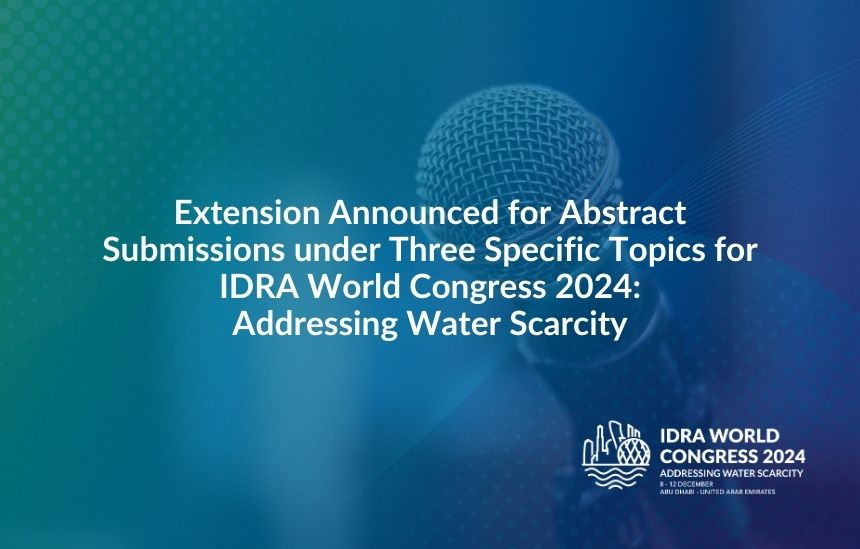IDRA is pleased to announce a special extension on the call for extended abstracts for three specific topics. The call will remain open until March 10, 2024.
Billions of people still lack access to safe water, sanitation facilities, and clean water for agricultural purposes remains under constant threat. With population growth, industrial water demands, and the rising global temperature, water security is at risk. Desalination and Water Reuse solutions coupled with renewable energy, where possible, merge as resilient solutions within IWRM strategies.
This IDRA World Congress is strategically designed to pave the way to a more secure water future by delving into various technical, development, and business topics that revolve around innovative desalination and water reuse solutions to offset water scarcity. As such, we extend the deadline to March 10 for abstract submissions (2-4 pages) on the following topics.
3. Desalination and Reuse: Public-Private Partnerships (PPP) and Finance
Topic Chair: Mr. Zael Uriarte, Senior Water and Sanitation Specialist, World Bank
The financial impact on water costs and project viability is relevant to addressing the actual macroeconomic situation that could jeopardize the global clean water availability challenge.
The innovation in financing structures and coverages is relevant to achieving project development even in adverse scenarios. The adaptation capacity of these solutions will open new investment opportunities.
We look for papers and case studies related to topics such as:
- New Creative Financing Structures to Optimize Water Cost
- ESG Financing, Green Bonds
- Innovations in Securities and Guarantees
- Government Support to Manage Water Costs, New Tax Structures, Grants… Carbon Negative Finance Incentives to Leverage Water Cost Reduction Project Delivery Models for Big-Desal
- Big Data for Financing Models
- Long-term Successes with Project Models and Financing
- Desalination Price Challenges and Realities
- Water Price, Inflation, Wars, Conflicts, Interest Rates Increase and their impact on water availability
- Financing Adaptation to Particular Conditions to a Project Location
8. Desalination and Reuse: Irrigation and Food Security
Topic Chair: Eng. Ali Mahmoud Ahmad Alshrouf, Senior Consultant & Researcher, Abu Dhabi Agriculture and Food Safety Authority (ADAFSA)
The four pillars of food security are availability, access, utilization, and stability.
Agriculture irrigation accounts for 70% of water use worldwide and over 40% in many OECD countries. Intensive groundwater pumping for irrigation depletes aquifers and can lead to negative environmental externalities, causing significant economic impact on the sector and beyond. In addition, agriculture remains a major source of water pollution; agricultural fertilizer run-off and pesticide use contribute to the pollution of waterways and groundwater.
We invite you to submit case studies and papers on topics such as:
- Utilization of unconventional water sources, desalination, and water reuse, in water treatment for food, beverage, and agriculture production.
- Development of crops that require less water and/or are more tolerant to higher water salinities.
- Case studies on the efficient use of desalination and recycled water for irrigation.
9. Desalination and Reuse: Social Responsibility
Topic Chair: Dr. Hoon Hyung, President, LG Water Solutions
Social responsibility is a means of achieving sustainability. Adopting key social responsibility principles, such as accountability and transparency, can help ensure the long-term viability and success of any organization or system. Corporate social responsibility is generally categorized in four ways: environmental responsibility, ethical/human rights responsibility, philanthropic responsibility, and economic responsibility.
We would like to receive case studies and papers on topics such as:
- Generating and providing water in geographically and socially challenged regions. Best practices
- Community Engagement and Education
- Economic Benefits of Clean Water for Local Communities
- Environmental practices
- Safety on-site
Interested contributors can submit their extended abstracts before March 10, 2024, through the official website of the IDRA World Congress. For comprehensive details on the submission process and event registration, please visit wc.idadesal.org.




